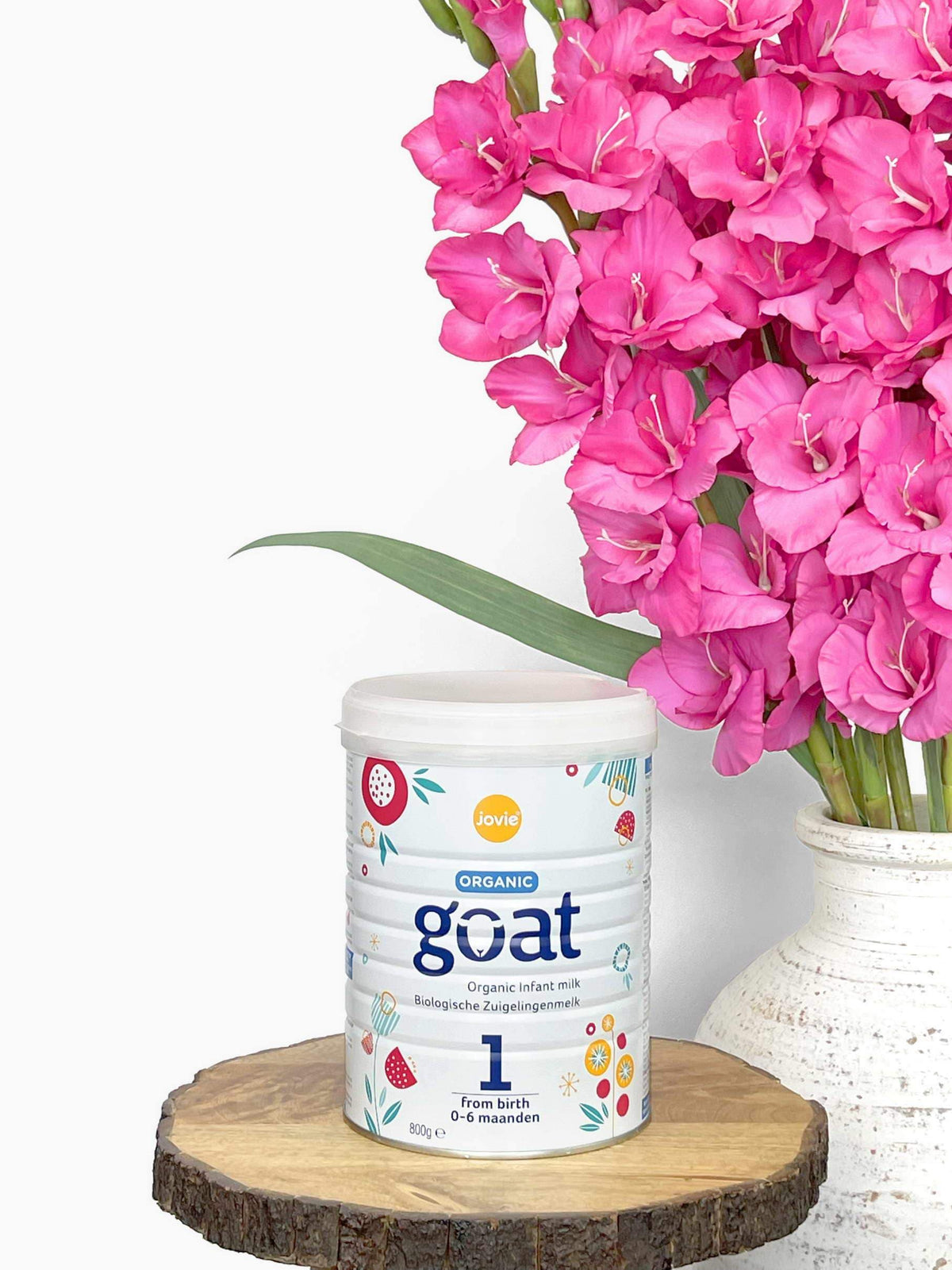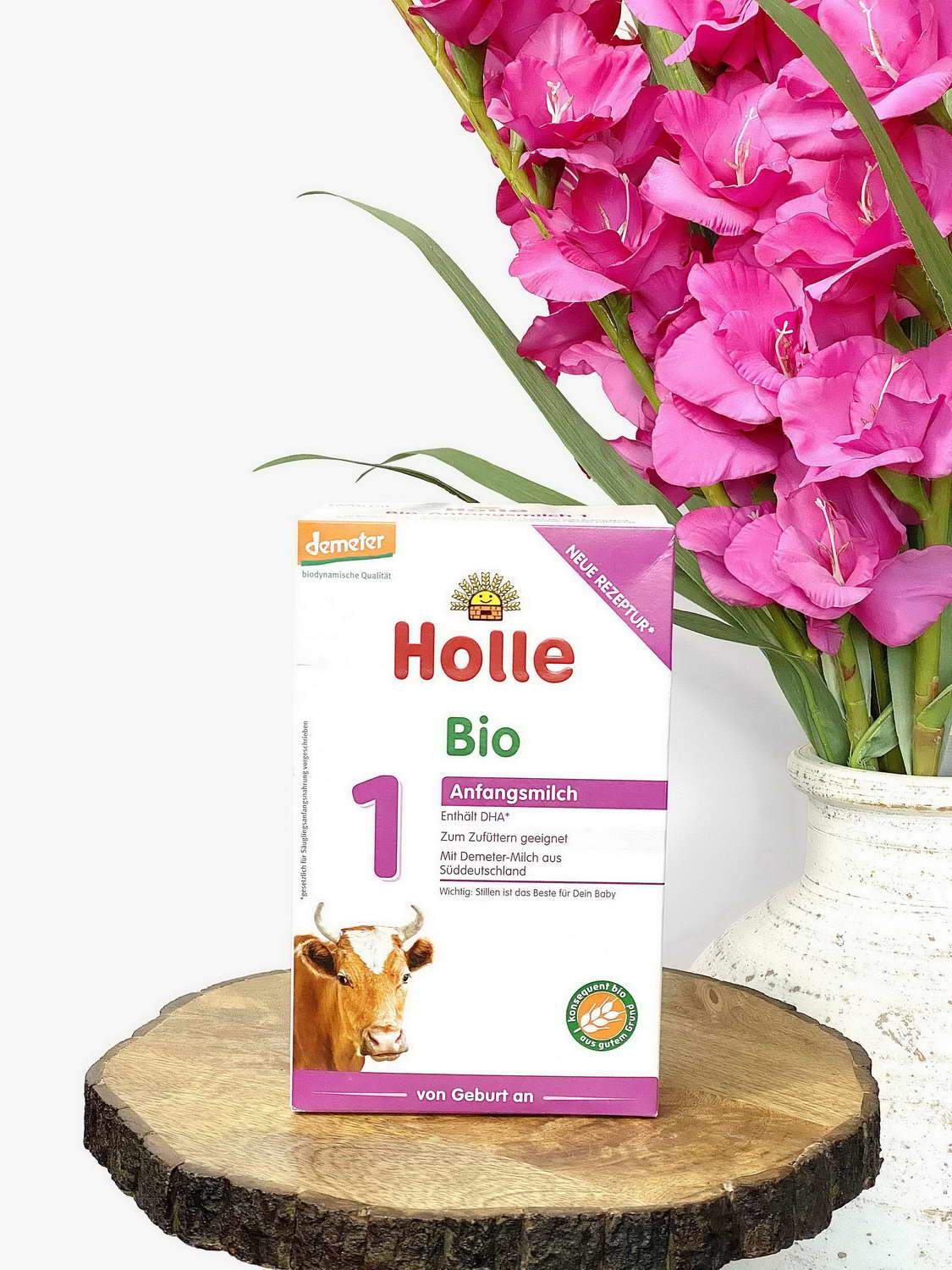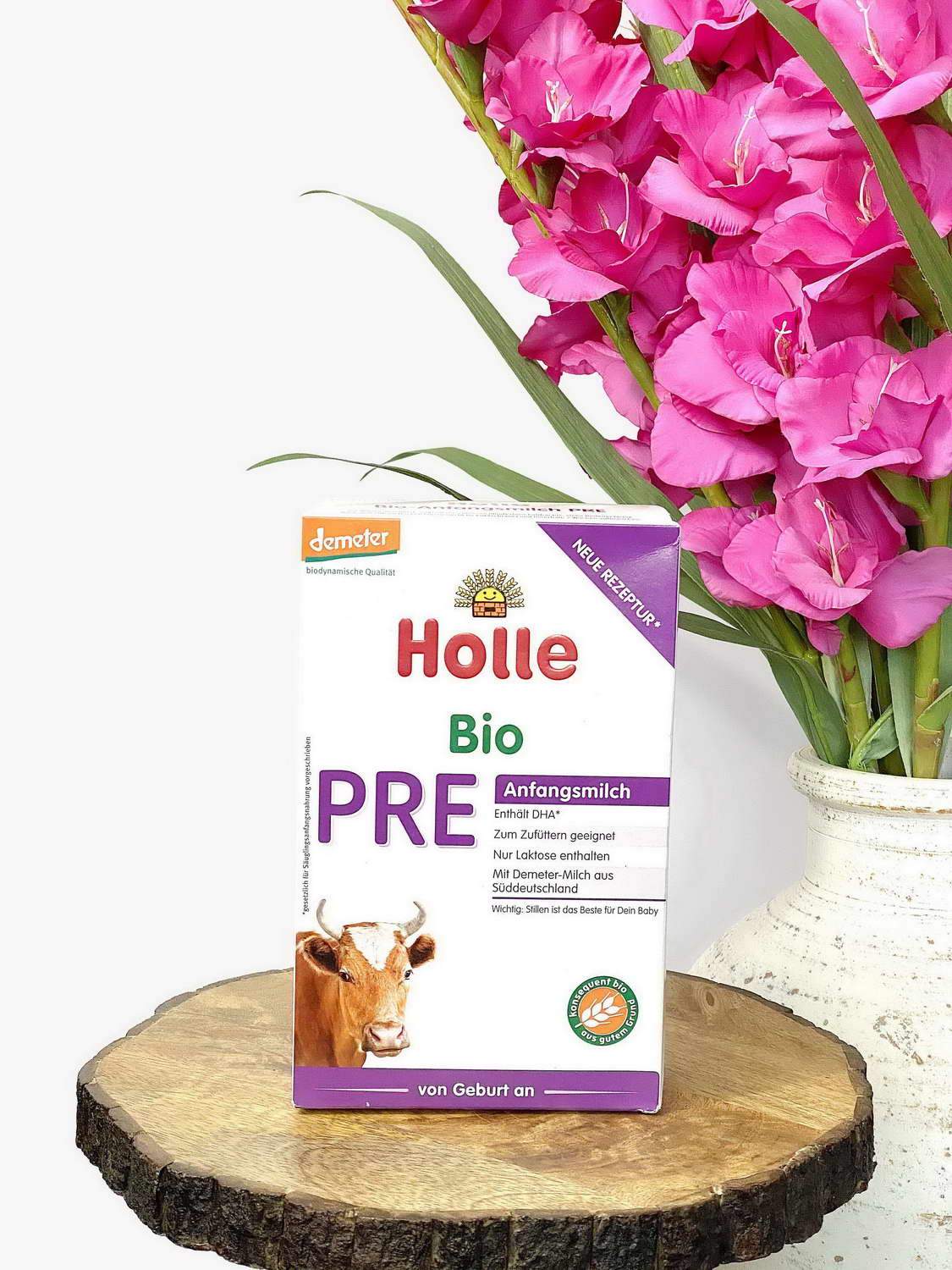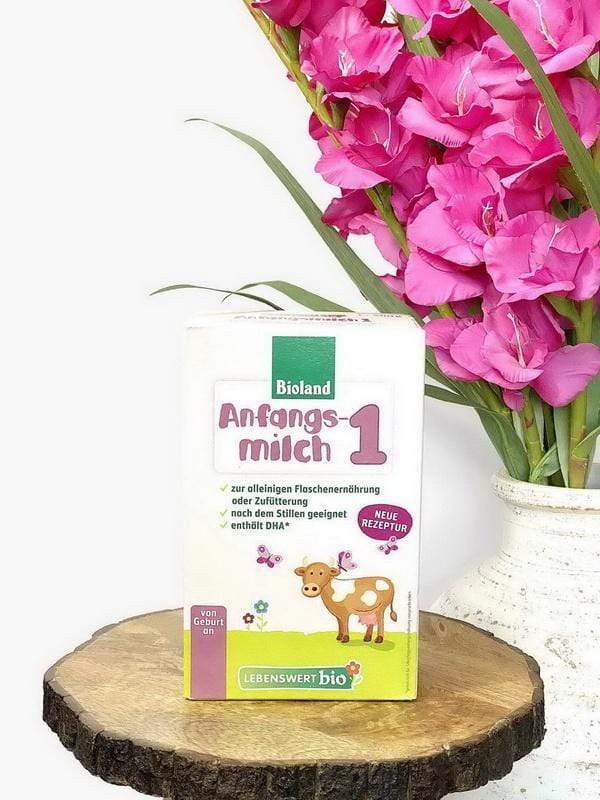The perfect bottle begins with the perfect formula
For moms who can't breastfeed or who have chosen not to, organic European baby formula from My Organic Company provides the closest alternative to breastmilk.
The special design of European baby formulas ensures that your baby receives all the necessary nutrients and in the healthiest way possible. European baby formula gives your infant the very best start in life by meeting the nutrition needs at every age and stage.
My Organic Company formulas are 100% organic cow milk or 100% organic goat milk without harmful additives, chemicals, or preservatives added. You will never see corn syrup, glucose syrup solids, or sugar found in these formulas like you see in baby formulas made in the United States.
If your baby is a newborn (or soon to arrive) up until six months, you will want to check out stage one European formulas. We list our top stage 1 baby formula before by category for parents to quickly choose:
Best Skimmed Milk Formula
HiPP Dutch Stage 1
Age: 0-6 months
Size: 800g / 28.22oz
Why Choose?
Prebiotics & Probiotics for healthy digestion, No Maltodextrin, Skimmed Milk
Best Baby Formula Without Prebiotics and Probiotics
Holle Bio Stage 1
Age: 0-6 months
Size: 400g / 14oz
Why Choose?
Biodynamic & Demeter organic certified, Maltodextrin for fuller tummies, No added prebiotics/probiotics
Best Cow Milk Formula Alternative
Holle Goat's Milk Stage 1
Age: 0-6 months
Size: 400g / 14oz
Why Choose?
Biodynamic Organic A2 Whole Goat Milk, Organic Maltodextrin, No Palm Oil
Best Whole Milk Formula
Kendamil Stage 1
Age: 0-6 months
Size: 800g / 28.22oz
Why Choose?
Whole Milk option with MGFM, DHA/ARA from Algae Oil instead of Fish Oil, No Palm Oil
Cleanest Version of Baby Formula
Lebenswert Stage 1
Age: 0-6 months
Size: 500g / 17.6oz
Why Choose?
Bioland organic certified, No added Maltodextrin or extras - most basic and essential ingredients
Best Skimmed Milk Formula without Palm Oil
Loulouka Stage 1
Age: 0-6 months
Size: 900g / 32oz
Why Choose?
Coconut Oil instead of Palm Oil, Milk from Grass Fed Swiss Cows
After choosing the finest eco-friendly, chemical free and 100% organic baby formula you need to know how to prepare the perfect bottle of baby formula.
How to Prepare a Baby Bottle: Basic Hygiene
Wash your hands
- Washing your hands thoroughly each and every time you prepare baby formula
- Washing is especially important after using the restroom, diaper changes, or when in public areas
- Using warm soapy water, rub hands together vigorously for 20 seconds
- Make sure to wash in between fingers and fingernails
Check the baby formula container for expiration and condition
- Do not use baby formula with an expiration date or use date that has passed
*Important note* European dates format is always DAY / MONTH / YEAR
- Check boxed baby formula for any obvious punctures, rips, holes, or leaks to the inside container
- Check round baby formula containers for any bulges, leaks, or rust (dents are fine as long as the formula is not leaking from the dent)
Sterilize bottles
- Sterilize all bottles, bottle rings, nipples and caps when using for the 1st time
- Cover all pieces with water and boil for 5 minutes
- Remove carefully with tongs before letting them air-dry until cool
- After the first use it is not necessary to sterilize each time
Clean and prepare surface
- Sterilize any equipment or kitchen tools used in preparing baby formula
- Use a non-toxic cleaner to wipe down any and all surfaces where baby formula will be prepared or stored
Best Baby Bottles
With so many baby bottles on the market, choosing the best baby bottle for your infant can be overwhelming. Here is a quick look into baby bottles:
Say no to plastic baby bottles
- BPA or bisphenol A (BPA) is used to make the polycarbonate and epoxy resins found in baby bottles
- Recent studies have linked exposure of the chemical BPA to damaging of developing brains and tissues as well as a heightened risk of cancer later in life
- BPA can be found in plastic baby bottles when they are exposed to a hot liquid such as baby formula
- Plastic can take up to 1,000 years to decompose
A safe baby bottle
-
When it comes to glass baby bottle vs. stainless steel baby bottles the choice is yours as both are:
- Made without harmful chemicals
- Toxin-free
- Eco-friendly
Best Water for Baby Formula
You have ensured your little one has the very best in chemical and additive-free baby formula, and you have stocked up on eco-friendly, non-toxic baby bottles, so what about the water?
Tap water
Even though most water in the United States that comes from home faucets is safe to drink, it is still best to boil tap water and let it cool to the correct temperature before using it to make your baby’s formula.
Bringing cold water to a full-bubbling boil kills any germs, bacteria, or viruses. These things can find their way into the water supply if pipes are old or leaky, if there’s heavy rain or flooding in your area, or if there are problems with the main water supply.
Boil
- Start with cold water - cold water avoids the extra-heavy metals that can be found in a hot water tank
- Fill a clean-pot or kettle with the cold water
- Bring the water to a rolling boil
- Water should be heated to at least 158 degrees Fahrenheit to kill bacteria
- Let it boil for at least 2 minutes
- Remove it from the heat
- Let the water cool to about body temperature — 98.6°F (37°C).
Fluoride
In most communities in the United States, the tap water has added fluoride to help prevent cavities.
The American Dental Association supports the addition of fluoride to water to protect dental health; however, too much fluoride in the body can stain teeth with white lines, known as dental fluorosis.
Depending on the level of fluoride in your area, if you use tap water all the time it is possible for babies, because they are tiny, to get too much fluoride.
We know that boiling tap water doesn’t change how much fluoride is in it. Home water filters can’t remove fluoride either.
If you think your baby is getting too much fluoride, talk with your doctor about alternating between using tap water and low-fluoride bottled water to make your baby’s formula.
Low fluoride tap water might be labeled as “demineralized,” “purified,” “distilled,” or “deionized.” This means that some fluoride is removed.
Well Water
If your drinking water comes from a well, it is possible that it might have higher levels of minerals than are normally wanted to make baby formula.
Well water can easily be contaminated with toxins from the dirt or groundwater around it. This leeching is known to add toxins that can be dangerous to babies.
If your home gets its tap water from a well, ask your local municipality or extension office to test samples of your water.
While waiting on the test to be returned, it is best to avoid using the well water to make your baby’s formula. Use low fluoride bottled water for your baby instead.
Bottled Water
If you find it necessary or prefer to use bottled water to make your baby’s formula, you might be able to find bottled water that’s sold just for babies.
Nursery water, as it is often called, is water that has been sterilized by boiling before being bottled. Mostly found in gallon size, nursery water can be hard to find and is often more expensive than regular bottled water.
Although you can use any bottled water to make baby formula, it will still need to be boiled. Even though bottled water is safe to drink for adults, it might not be as safe for babies.
Bottled water may have been on the shelf for a while or gotten contaminated. It’s best to be on the safe side and take the time to boil even bottled water.
Baby Bottle Water Prepared
You can boil water in advance so that you are ready for when your little is hungry. Remember hygiene is very important every step of baby formula preparation.
- Start with clean hands
- Sterile glass jars or jugs and the lids you will use to store the boiled water
- Sterilize them by pouring boiling water into them and rinsing out with boiled water
- Don’t use tap water to rinse them out; they won’t be sterile anymore if you do
- Store at room temperature, out of direct sunlight for 24 hours or refrigerated for up to three days
How to Mix Baby Formula
Now that you have researched, inspected, sanitized, and boiled, it is time to put the baby bottle together.
It is important that you mix the powdered baby formula exactly like instructed. Baby formula preparation is an exact science and has been designed perfectly to meet the nutritional needs of your infant.
Individual baby bottles of formula
- Start with the carefully measured amount of water you need to be added to the bottle first
- Use the scoop that came with the container, making sure it has been sanitized and dried
- Follow the instruction that was given with your baby formula to determine the amount of scoops required
- Fill the scoop with powdered formula, leveling any excess with a flat surface
- Pour powdered formula into the bottle
- Attach the nipple and cap and shake well
How to Warm Baby Bottle
While it is not necessary to heat a baby’s bottle; many babies have a strong preference for warm milk. In newborns, warmed baby formula also helps maintain body temperature and is comforting.
When a baby is hungry and crying, we want to quickly warm a bottle and soothe our sweet little one. It can be frustrating for both the caregiver and the baby to wait.
Be Patient
To preserve the nutrients in baby formula, you will want to raise the temperature in the bottle gently. The ideal milk temperature is at or just below body temperature – 98.6 degrees Fahrenheit.
Raising the temperature of the baby formula slowly will also help to ensure that there are no hotspots or uneven heating that can cause burning on your baby's skin, mouth, or throat.
You can use the wrist method to test the temperature; just drop a couple dribbles from the bottle onto the inside of your wrist. If it feels cold, warm it up a little more; if it feels hot, let it cool.
Microwave
Microwaving baby formula is not generally recommended. The most pressing reason being while the bottle may feel cool after microwaving it, the baby formula inside can actually be really hot. This uneven heating will cause severe burns to your little one’s mouth and tongue.
There has also been debate for several years on microwaving baby formula. Some conjecture is that most of its anti-infectant properties and its antibodies are lost, as well as creating an environment in which bacteria could flourish.
While contemporary thoughts are that microwaving baby formula will not harm the nutrients found in baby formula, many parents do not consider this a chance worth taking.
Hot Tap Water Method
- Hold the baby bottle filled with cold prepared formula under warm-to-hot running water
- Rotate it around to reach all sides for roughly two minutes
Using hot tap water in a glass mug to place your baby bottle in also works:
- Fill a mug ¾ full of warm-to-hot tap water
- Place baby bottle filled with cold prepared formula in mug
- Let sit for approximately 2 minutes
Stove Top Method
- Heat water in a pan until just above room temperature
- Remove the pan from the heat
- Set the bottle in it until desired temperature
Baby Bottle Warmer
Baby bottle warmers can take the guesswork out of warming bottles. This hands-free solution warms your baby bottle with a touch of a button.
Bottles come in different shapes and sizes, so be sure your bottles will fit into the warmer you select or choose one that adjusts to many sizes.
- Start by removing the nipple and collar of the bottle
- Cover with warming cap or travel cap
- Set for recommended time
- Remove bottle carefully
- Replace collar and nipple
Test the Temperature
No matter which method you use, remember your little one's safety comes first! It is imperative to always test the baby formula before giving the bottle to your baby to avoid burning their mouth.
Dab a few drops of milk onto your inner wrist; you should feel almost nothing if it’s the appropriate temperature.
Most babies prefer milk that’s as close to body temperature as possible. If you feel no warm sensation on your wrist, the temperature is perfect.
If it’s slightly cool your baby may still find it acceptable, but if you feel too warm at all, the bottle is too hot. Wait until it cools down to offer it to your little one.
Making Formula Bottles in Advance
Mixed baby formula may be stored in a refrigerator for up to 24 hours. If you are out in about, baby formula made in advance can be stored in an insulated cooler as long as it is cool to the touch.
After a baby bottle is warmed, the formula will last about 1 hour out at room temperature (and absolutely no more than 2 hours). At that time it should be placed back into the refrigerator or discarded to ensure baby will not get sick from growing bacteria.
If your baby does not finish a bottle of baby formula, never use the same bottle to re-feed. Always clean and/or sterilize baby bottles after meal time.
Only the Best for Your Formula Fed Baby
Beginning with the 100% organic cow milk or 100% organic goat milk formula that is free of harmful additives, chemicals, or preservatives all the way through to the toxin-free water, you want only the very best for your precious little one.
My Organic Company knows that making the perfect baby bottle is only part of your journey as parent and caregiver. Our team of moms and growing support circle is here for you. Check out our homepage to connect with our team or visit our online community via social media.














